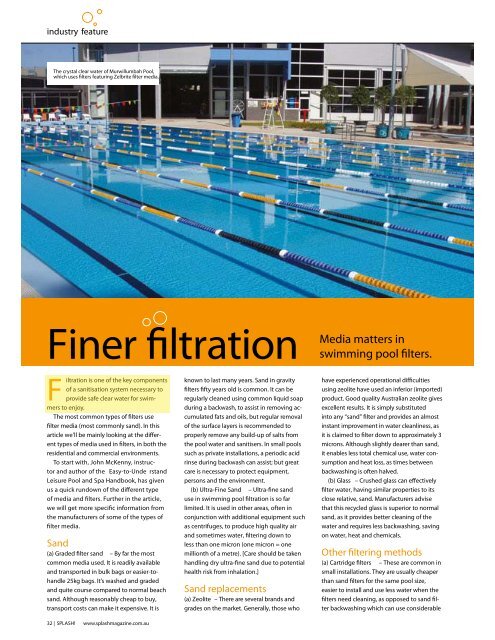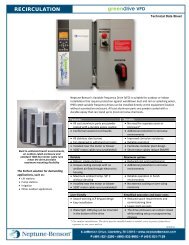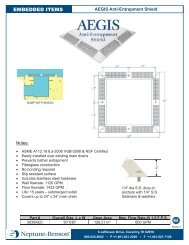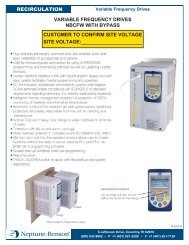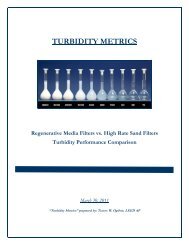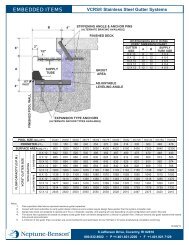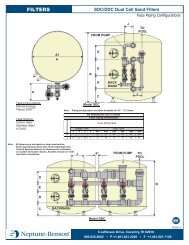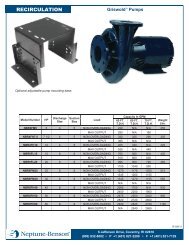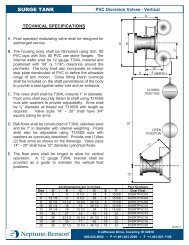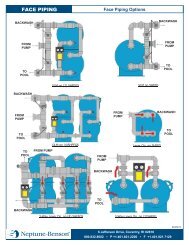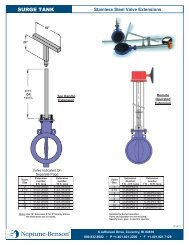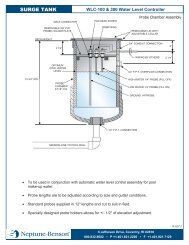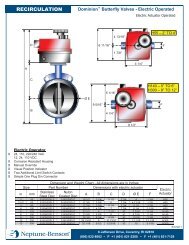See-through - Neptune-Benson
See-through - Neptune-Benson
See-through - Neptune-Benson
Create successful ePaper yourself
Turn your PDF publications into a flip-book with our unique Google optimized e-Paper software.
industry feature<br />
The crystal clear water of Murwillumbah Pool,<br />
which uses filters featuring Zelbrite filter media.<br />
Finer filtration<br />
Media matters in<br />
swimming pool filters.<br />
F<br />
iltration is one of the key components<br />
of a sanitisation system necessary to<br />
provide safe clear water for swimmers<br />
to enjoy.<br />
The most common types of filters use<br />
filter media (most commonly sand). In this<br />
article we’ll be mainly looking at the different<br />
types of media used in filters, in both the<br />
residential and commercial environments.<br />
To start with, John McKenny, instructor<br />
and author of the Easy-to-Unde rstand<br />
Leisure Pool and Spa Handbook, has given<br />
us a quick rundown of the different type<br />
of media and filters. Further in the article,<br />
we will get more specific information from<br />
the manufacturers of some of the types of<br />
filter media.<br />
Sand<br />
(a) Graded filter sand – By far the most<br />
common media used. It is readily available<br />
and transported in bulk bags or easier-tohandle<br />
25kg bags. It’s washed and graded<br />
and quite course compared to normal beach<br />
sand. Although reasonably cheap to buy,<br />
transport costs can make it expensive. It is<br />
32 | SPLASH! www.splashmagazine.com.au<br />
known to last many years. Sand in gravity<br />
filters fifty years old is common. It can be<br />
regularly cleaned using common liquid soap<br />
during a backwash, to assist in removing accumulated<br />
fats and oils, but regular removal<br />
of the surface layers is recommended to<br />
properly remove any build-up of salts from<br />
the pool water and sanitisers. In small pools<br />
such as private installations, a periodic acid<br />
rinse during backwash can assist; but great<br />
care is necessary to protect equipment,<br />
persons and the environment.<br />
(b) Ultra-Fine Sand – Ultra-fine sand<br />
use in swimming pool filtration is so far<br />
limited. It is used in other areas, often in<br />
conjunction with additional equipment such<br />
as centrifuges, to produce high quality air<br />
and sometimes water, filtering down to<br />
less than one micron (one micron = one<br />
millionth of a metre). [Care should be taken<br />
handling dry ultra-fine sand due to potential<br />
health risk from inhalation.]<br />
Sand replacements<br />
(a) Zeolite – There are several brands and<br />
grades on the market. Generally, those who<br />
have experienced operational difficulties<br />
using zeolite have used an inferior (imported)<br />
product. Good quality Australian zeolite gives<br />
excellent results. It is simply substituted<br />
into any “sand” filter and provides an almost<br />
instant improvement in water cleanliness, as<br />
it is claimed to filter down to approximately 3<br />
microns. Although slightly dearer than sand,<br />
it enables less total chemical use, water consumption<br />
and heat loss, as times between<br />
backwashing is often halved.<br />
(b) Glass – Crushed glass can effectively<br />
filter water, having similar properties to its<br />
close relative, sand. Manufacturers advise<br />
that this recycled glass is superior to normal<br />
sand, as it provides better cleaning of the<br />
water and requires less backwashing, saving<br />
on water, heat and chemicals.<br />
Other filtering methods<br />
(a) Cartridge filters – These are common in<br />
small installations. They are usually cheaper<br />
than sand filters for the same pool size,<br />
easier to install and use less water when the<br />
filters need cleaning, as opposed to sand filter<br />
backwashing which can use considerable


